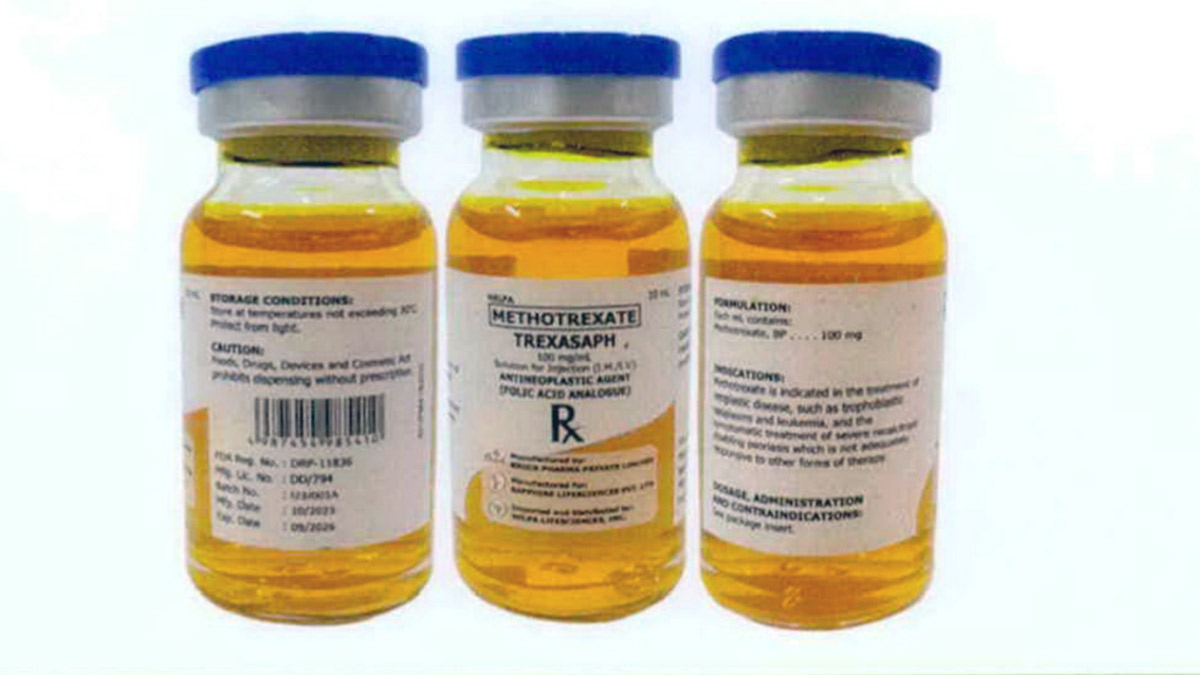FDA again orders recall of chemo drug
MANILA, Philippines — The Philippine Food and Drug Administration (FDA) has issued a second order recalling imported chemotherapy drug Trexasaph, after more of its batches were found to be contaminated with a bacteria causing fatal infections.
Under the agency’s Advisory No. 2024-0741 dated May 3, FDA Director General Dr. Samuel Zacate ordered a product recall of Trexasaph (with generic name Methotrexate) 100 mg/mL solution for injection (IM/IV) with Batch Nos. I23F025A, I23J001A, I23K002A and I23H018A.
ADVERTISEMENT
Methotrexate is a chemotherapy agent and immune system suppressant. It is used in the treatment of neoplastics disease (cancers), such as trophoblastic neoplasms and leukemia, and the symptomatic treatment of recalcitrant disabling psoriasis, which is not adequately responsive to other forms of therapy.
READ: FDA orders recall of chemotherapy injectable
Patients receiving methotrexate treatment may have weakened immune systems and become more vulnerable to opportunistic infections.
“Following the received adverse reaction report involving a pediatric patient administered with Trexasaph, the [FDA] conducted laboratory analysis on the collected samples. The Trexasaph with Batch No. I23J001A failed the sterility test and was found positive with Pseudomonas aeruginosa, indicating contamination of the products,” the FDA said.
P. aeruginosa is commonly contracted by patients who have been hospitalized longer than a week. It can cause bloodstream infection (sepsis) which may lead to death. Any product that has any contamination and is administered directly in the body would present serious risks to patients.
The bacteria can grow and spread in many different ways, including through water (from sinks, bathtubs, pools, hot tubs, humidifiers and kitchens), soil, and food and contaminated medical devices (such as a ventilator or urinary catheter).
P. aeruginosa infection can pass from person to person, usually from contaminated surfaces or hands.
ADVERTISEMENT
‘Areas of jurisdiction’
The regulator directed distributors, hospitals, retailers, pharmacies and clinics to discontinue further distribution, sale and use of Trexasaph.
Consumers are also advised not to use or purchase the affected products.
“All local government units and law enforcement agencies are requested to ensure that the affected product lot is not sold or made available in their localities or areas of jurisdiction,” the FDA noted.
Based on the FDA’s database, Trexasaph is manufactured by India-based Bruck Pharma Private Ltd. and imported by Nelpa Lifesciences Inc. in Parañaque City.
It has been registered with the FDA since May 2022 and its registration is set to expire in May 2027.
This is the second time in the year that the FDA issued a recall order against Trexasaph.
In March, the FDA issued an advisory warning all government and private health-care facilities to stop the selling, dispensing and use of Trexasaph after a sample belonging to Batch No. I23J001A tested positive with P. aeruginosa.
To report continuous sale or distribution of the affected batches of Trexasaph, the public may send an e-mail to the FDA via [email protected], or also call its Center for Drug Regulation and Research at telephone No. (02) 8809-5596.
Scheepril also recalled
The FDA also ordered a product recall of Scheepril (with generic name Enalapril maleate) 10 mg tablet with Lot No. 29080, for having a lesser amount of its active ingredient than indicated.
“The result of the laboratory analyses conducted by the FDA showed that the specific lot only contains 8.54 mg of Enalapril maleate per tablet,” Zacate said under FDA Advisory No. 2024-0740 dated May 3.
Scheepril is manufactured by Scheele Laboratories Philippines Inc. based in Valenzuela City.
Your subscription could not be saved. Please try again.
Your subscription has been successful.
Enalapril maleate is an angiotensin-converting enzyme inhibitor used in the treatment of hypertension (high blood pressure) to help prevent strokes, heart attacks and kidney problems.
It may also be given to patients with certain heart problems (including asymptomatic left ventricular dysfunction) to delay the development of heart failure, and to reduce the incidence of coronary ischemic events, including heart attack.
EDITORS’ PICK
MOST READ
View comments

